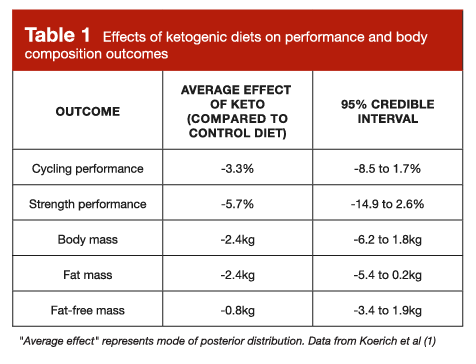Keto is a popular topic, and I suspect that anyone with a Twitter account understands why. When I log in, I am absolutely inundated with dubious content that vilifies carbohydrates while promoting ketogenic diets for a wide range of applications across a broad range of populations.
It’s possible that my Twitter experience is uniquely driven by my content consumption and engagement habits, but I think there are plenty of folks with similar experiences to mine. My social media curse is that I, by default, interact more with content that opposes my views than content that reaffirms my views. This isn’t because I love going around picking fights — rather, it’s because I want to see why people have arrived at conclusions that contradict my own. I can easily see that we’ve reached divergent conclusions, but I’m interested in understanding more about where and why we diverged from one another.
To be clear, I do not categorically oppose the use of low-carb (or very-low-carb) diets. There are scenarios in which switching from a more “traditional” macronutrient split to a very carb-restricted diet may be advisable, inconsequential, or inadvisable, depending on the specific circumstances. Unfortunately, most of the nutrition content I disagree with on Twitter comes from people who promote ketogenic diets as a one-size-fits-all, universally superior dietary approach.
Every time I review a ketogenic diet paper, I reassess (and update, as needed) my working conclusions about ketogenic diets. To quickly get everyone up to speed, let’s take a look at the results of the keto studies we’ve covered so far:
- Compared to a control group, subjects on a ketogenic diet lost more fat but gained less lean mass over the course of a resistance training program, presumably because they were unable to achieve a prescribed surplus (2)
- Compared to a control group, subjects on a ketogenic diet once again lost more fat while gaining less lean mass over the course of a resistance training program, and once again tended to consume fewer calories relative to the control group. The control group also made better strength gains (3)
- Compared to a control group, subjects on a cyclical ketogenic diet led to less favorable changes in fat mass, skeletal muscle mass, and strength gains over the course of a training intervention (4)
- Compared to a control group, subjects on a ketogenic diet lost more fat but gained less fat-free mass over the course of an 8-week intervention. Both groups made similar strength gains, but training programs weren’t standardized, so those findings are a bit challenging to interpret (5)
As of our most recent keto article in MASS Research Review, I had concluded that ketogenic diets are viable alternatives to more traditional macronutrient splits in some very specific scenarios: a person who is primarily focused on fat loss, a person with a relatively low-volume resistance training program, a person who exclusively participates in low-intensity forms of exercise, or a person who simply doesn’t prioritize lean mass accretion or high-intensity exercise performance. For people who engage in moderate-to-high volume resistance training, prioritize moderate-to-high intensity exercise performance, or are primarily interested in gaining lean mass, ketogenic diets seem difficult to justify as a fully optimal approach. That doesn’t mean that gains are impossible on keto, or that their effects on resistance training adaptations are catastrophic; it merely indicates that the “default” approach for those wishing to optimize such adaptations probably ought to be a more moderate or traditional macronutrient split that leaves plenty of room for carbohydrate intake.
A new meta-analysis puts some of these working conclusions to the test (1). The researchers systematically reviewed the literature, pooled the relevant data, and conducted meta-analyses to assess the effects of ketogenic diets on body composition and performance outcomes in comparison to alternative diets. They specifically restricted their analysis to studies comparing ketogenic diets (60-80% of calories from fat, with <10% of calories from carbs or <50g/day of carbs) to non-ketogenic diets (≥40% of calories from carbs) in trained subjects or athletes who were aged 18-60 years old. Studies were only included if they were randomized or non-randomized controlled trials that assessed at least one outcome of interest (body composition, maximal strength [1RM], or cycling outcomes including time-trial performance, time to exhaustion, or maximal speed or power output during an incremental exercise test). The researchers identified 18 studies that fit the criteria for their systematic review, and 16 of them were suitable for inclusion in their quantitative meta-analyses.
The meta-analytic results are presented in Table 1. Ketogenic diets were less favorable than control diets for cycling performance, strength performance, and changes in fat-free mass. However, ketogenic diets were more favorable for reductions in body mass and fat mass.

I’ll note that Table 1 includes the “average” effect of keto, in addition to the 95% credible interval. This terminology is probably a bit different from what you’re accustomed to for meta-analyses, which is a direct consequence of the researchers’ decision to do a Bayesian analysis (rather than the standard frequentist analysis). This is a completely valid decision, and some would argue that Bayesian analyses are an upgrade from the more common frequentist approach. For the purposes of interpretation, one key difference is that Bayesian analyses aren’t designed to calculate p-values, but rather to make probabilistic inferences about which hypothesis seems to be more supported by the data. In the presently reviewed meta-analysis, they used the “region of practical equivalence method” to draw inferences from the statistical models. This allows them to calculate three separate probabilities for each outcome (which I’ll oversimplify a bit here): the probability that the evidence leans in favor of the control diet being superior, the probability that the evidence leans in favor of the ketogenic diet being superior, and the probability that the two diets are practically equivalent. Without bombarding you with 15 probability values, I’ll merely reiterate that the data leaned in favor of control diets for cycling performance, strength performance, and changes in fat-free mass, but leaned in favor of ketogenic diets for reductions in body mass and fat mass.
A second key difference is that frequentist meta-analyses spit out a single pooled effect size estimate, and a corresponding 95% confidence interval. In contrast, a Bayesian meta-analysis spits out a distribution of possible effect size values (rather than a single pooled effect size), which is known as a posterior distribution. The 95% credible interval tells us, “given the observed data, the effect has 95% probability of falling within this range.” If you’re thinking, “wait a minute… isn’t that the same interpretation as a 95% confidence interval?” then you’re not alone, but the answer’s actually no. The actual, correct interpretation of a 95% confidence interval is irrationally convoluted and theoretical, so this is a situation in which the more sophisticated method (Bayesian analysis) actually returns a more easily interpretable output. Anyway, enough about that – if you’d like to read more about the difference between confidence intervals and credible intervals, you can find that information here.
Overall, this meta-analysis largely confirms the working conclusions proposed in my most recent MASS article about keto: a well-constructed ketogenic diet can be a viable option during a fat loss phase, but ketogenic diets don’t seem to be the best option for lifters or athletes who are primarily focused on hypertrophy or high-intensity exercise performance. As I frequently note in MASS articles about keto, the impact on fat-free mass might be exaggerated by glycogen loss, but the general pattern still seems to hold. You’ll notice that this conclusion frames ketogenic diets as neither bad nor good; there are circumstances in which keto is advantageous, circumstances in which keto is very inadvisable, and circumstances in which ketogenic and non-ketogenic diets can be viewed as fairly equivalent.
I find much of the discourse surrounding ketogenic diets to be very unfortunate. Some folks act like ketogenic diets are unequivocally superior in all contexts. They frame keto as a metabolic biohack that the medical-pharmaceutical-industrial complex doesn’t want you to know about, all so they can keep you in a state of perpetual metabolic dysfunction and chronic disease. That’s dumb. However, this constant barrage of bad keto content has led many skeptical folks to assume that anyone speaking favorably (or even neutrally) about ketogenic diets is a quack by default. As a result, the reputation of ketogenic diets within the evidence-based fitness world is probably worse than the actual data would warrant. It’s a bit ironic – many of the people most eager to promote keto are actually tarnishing its reputation through their outlandish claims and lack of nuance.
The presently reviewed meta-analysis confirms the previous trials reviewed in MASS, with the current evidence pointing to some pretty straightforward takeaways. If your top priority is hypertrophy or physical performance during exercise tasks that are glycolytic in nature (which would include many, but not all, approaches to resistance training), then keto probably isn’t the most optimal path forward. That doesn’t mean progress will be completely blunted if you follow a ketogenic diet, it merely means that a non-ketogenic diet might have yielded slightly larger or faster returns on your training investment. For people who simply prefer the way they feel on a ketogenic diet (or prefer the food options it enables), settling for less optimal (but still positive) progress might be a tradeoff they’re happy to make. If your goal is fat loss, then ketogenic diets are a viable option to consider, especially if you have a preference for fatty foods and tend to struggle with hunger while dieting. If you’re on a pretty low-volume resistance training program with relatively low rep ranges, you might not observe much of a difference when comparing ketogenic to non-ketogenic diets. So, rather than framing ketogenic diets as “good” or “bad,” we should be asking when and for whom they might be better, worse, or equivalent to alternative options. Fortunately, the literature continues to provide more and more clarity for answering that question.
Note: This article was published in partnership with MASS Research Review. Full versions of Research Spotlight breakdowns are originally published in MASS Research Review. Subscribe to MASS to get a monthly publication with breakdowns of recent exercise and nutrition studies.
References
- Koerich ACC, Borszcz FK, Thives Mello A, de Lucas RD, Hansen F. Effects Of The Ketogenic Diet On Performance And Body Composition In Athletes And Trained Adults: A Systematic Review And Bayesian Multivariate Multilevel Meta-Analysis And Meta-Regression. Crit Rev Food Sci Nutr. 2022 Jun 27;1–26.
- Vargas S, Romance R, Petro JL, Bonilla DA, Galancho I, Espinar S, et al. Efficacy Of Ketogenic Diet On Body Composition During Resistance Training In Trained Men: A Randomized Controlled Trial. J Int Soc Sports Nutr. 2018 Jul 9;15(1):31.
- Vargas-Molina S, Petro JL, Romance R, Kreider RB, Schoenfeld BJ, Bonilla DA, et al. Effects Of A Ketogenic Diet On Body Composition And Strength In Trained Women. J Int Soc Sports Nutr. 2020 Apr 10;17(1):19.
- Kysel P, Haluzíková D, Doležalová RP, Laňková I, Lacinová Z, Kasperová BJ, et al. The Influence of Cyclical Ketogenic Reduction Diet vs. Nutritionally Balanced Reduction Diet on Body Composition, Strength, and Endurance Performance in Healthy Young Males: A Randomized Controlled Trial. Nutrients. 2020 Sep 16;12(9):E2832.
- Paoli A, Cenci L, Pompei P, Sahin N, Bianco A, Neri M, et al. Effects of Two Months of Very Low Carbohydrate Ketogenic Diet on Body Composition, Muscle Strength, Muscle Area, and Blood Parameters in Competitive Natural Body Builders. Nutrients. 2021 Jan 26;13(2):374.




